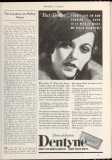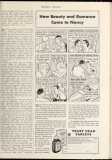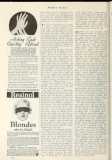





For Minnie's boy-friend knew days when producers wouldn't give him the price of a piece of cheese.
What would you say if you discovered that the greatest star of them all — a screen favorite who has leaped far above the heads of players like Garbo, Dietrich, Crawford or Barrymore — draws a salary of a mere two hundred dollars per week? You would immediately jump to the conclusion that I should be rushed around to the nearest padded cell, wouldn't you?
It is true, however. The most famous movie star in the world today is Mickey Mouse. He leads the band of popularity from Timbuktu to far Japan, where he is known all over the land as "Miki Kuchi." Each country has its own peculiar name for him. He has been placed, along with the other immortals, in Madame Tussaud's wax-works Hall of Fame. He has been acclaimed by writers, scientists, savants and the "Brain Trust" of the world. He has played command performances before the Kings and Queens of Europe. And his fan mail out-numbers that of any other star.
And yet, he is the only celluloid luminary who isn't riding around in a Rolls-Royce or living in a palace. The reason being, that the man responsible for him in even way, has his own ideas about success.
Walt Disney, creator of Mickey Mouse and Silly Symphonies, is a shy young man of thirty-three. He lives in a six-room bungalow five minutes walk from the studio where Mickey Mouse is made. He has a three-year-old car of modest cost, and his chief luxury, up until now, has been a new electric refrigerator. He is very happily married to a girl by the name of Lillian Bounds, who used to draw for him in his studio. Just recently, his wife presented him with a baby, and that, as you all know, is a far greater luxury than any ice-box. He takes a weekly salary for himself of two hundred dollars. Every other penny goes back into the making of Mickey Mouse and the Silly Symphonies.
Mickey Mouse is only five years old. When he was born, Disney tried to get every movie producer in Hollywood to back him financially. About this time, talkies had just appeared to give the film magnates further headaches, and bustling around trying to get sound effects into pictures which were almost finished, or had just been finished, made these same magnates deaf to Disney's entreaties. He decided to make them himself on the proverbial shoe-string. He also decided that Mickey needed sound effects to increase his attraction. He made Mickey dance and sing, and that was the beginning of such fantastic, incredible feats as elephants pirouetting like Follies girls ; pigs fiddling with the ease of concert masters ; wolves turning into Fuller Brush men as realistic as the most every-day visitor of that well-known household necessity to your back door.
[…]